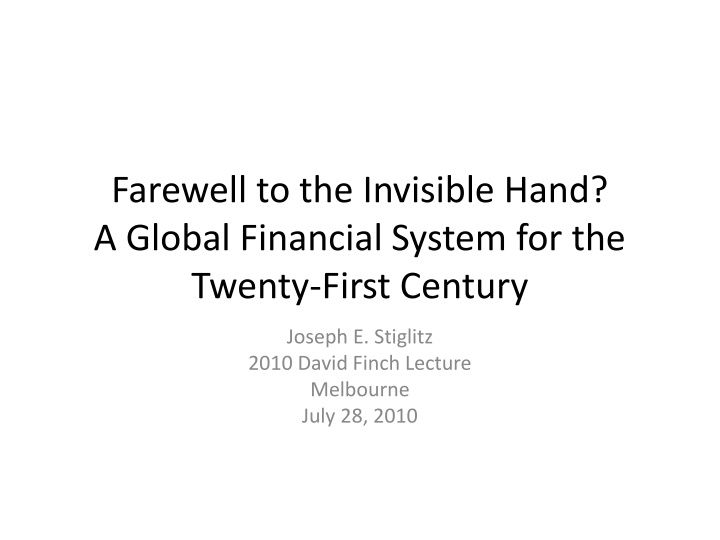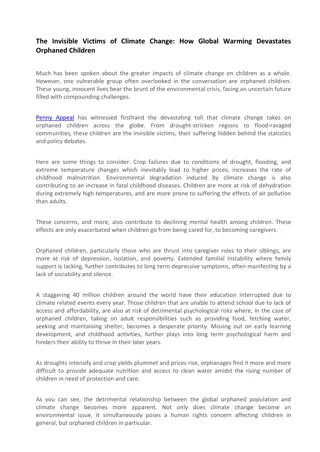- "Farewell to the Invisible Hand: The End of the Smithian Era?
- Adam Smith's concept of the "invisible hand" in modern economics is revisited in Joseph E. Stiglitz's discourse, questioning its relevance in a global financial system marred by crises and malpractices. This insightful examination delves into the failure of America's financial sector to fulfill its societal roles, highlighting misallocations, risks, and predatory behavior. Reflecting on modern economic theories, the text argues for interventions to enhance citizen well-being amidst imperfect markets. Explore the evolving landscape of financial systems in the twenty-first century through a critical lens.
Download Presentation

Please find below an Image/Link to download the presentation.
The content on the website is provided AS IS for your information and personal use only. It may not be sold, licensed, or shared on other websites without obtaining consent from the author.If you encounter any issues during the download, it is possible that the publisher has removed the file from their server.
You are allowed to download the files provided on this website for personal or commercial use, subject to the condition that they are used lawfully. All files are the property of their respective owners.
The content on the website is provided AS IS for your information and personal use only. It may not be sold, licensed, or shared on other websites without obtaining consent from the author.
E N D
Presentation Transcript
Farewell to the Invisible Hand? A Global Financial System for the Twenty-First Century Joseph E. Stiglitz 2010 David Finch Lecture Melbourne July 28, 2010
Adam Smiths Invisible Hand Perhaps the most important insight of modern economics: Individuals (and firms) in the pursuit of their own self-interest are led, as if by an invisible hand, to the well-being of society
The End of the Smithian Era? But no one believes that America s bankers, in their ruthless pursuit of their own self-interest (aka as greed) resulted in the well-being of society Not only did they bring about a global financial crisis But they engage in predatory pricing Anti-competitive practices led to super-normal profits Modern technology allows for the creation of an electronic payments system: they suppressed the creation of this system, imposing in effect a tax on every debit and credit transaction with proceeds going to enrich their coffers, not to enhance public welfare
Failure to perform key societal roles Financial markets are essential to the well-functioning of a modern economy Supposed to allocate capital, manage risk, and run a payments mechanism And an efficient financial system does this at low cost America s financial system misallocated capital, created risk, didn t create the 21stcentury payments mechanism that modern technology could have supported But nonetheless imposed huge costs on the rest of society 40% of all corporate profits before the crisis Incommensurate with the benefits that they generated Though there was a small part of America s financial sector that was doing a stupendous job the venture capital sector A sector that is now weak because of the misdeeds of the rest of the sector
What does modern economic theory have to say? A quarter century before the crisis modern economic theory had argued that Adam Smith was wrong The reason that the invisible hand often seems invisible is that it s not there Whenever there is imperfection (asymmetric information) or incomplete risk markets that is always markets are not Pareto efficient Even taking into account the costs of information and of creating and running markets, there are interventions that could improve the well-being of all citizens
These ideas are central to understanding financial markets Information (and information asymmetries) are at the center of financial markets Agency problems : decision makers interests are different from those on whose behalf they are suppose to be acting Bank officials did well, even as shareholders and bondholders lost Problems of corporate governance worse in the US than in some other countries A chain of agency problems Investors were off pension funds acting on behalf of retirees
Compensation Illustrates point Incentive structures were designed to induce excess risk taking and short sighted behavior Didn t even distinguish between those who increased profits by increasing beta (more risk) and alpha (better performance) Didn t distinguish between high returns because market was doing well and beating the market Inconsistent with efficient incentive systems Most of those in the financial system didn t understand this But some may have been deliberate attempt to take advantage of lack of understanding of investors
In many cases, compensation based on stock options Treating them as if they were manna from heaven Not dilution as shareholder value Resisted efforts even to make this transparent Enhanced incentives for bad information Which would increase shareholder value in the short run though not in the long run A market economy cannot run well with such distorted incentives
Externalities Main justification for regulation a failure of financial system has consequences for others The entire economic system was put at risk The US had policymakers and regulators who did not understand these limitations of markets Thought that markets were self-regulating Stripped away regulations that had provided the only period free of financial crises in the history of modern economies And did not adopt new regulations for changing financial sector (derivatives) We had regulators who did not believe in regulation
Greenspans Mea Culpa Had thought banks would have managed risk better Ignored distorted incentive structures/agency problems Ignored risk posed by too big to fail banks Ignored externalities didn t seem to understand why we have regulation in the first place
Financial Innovation Sector prided itself on innovation But innovation was mostly directed at circumventing regulation, taxes, and accounting standards Hard to identify an innovation that led to a more productive economy Easy to identify innovations that led to huge risks Borne by taxpayers New risk products didn t even help Americans manage the risk of their most important asset their home Actually, increased risk which is why so many are losing their homes There were alternatives but they have consistently resisted these good innovations
Not a surprise Incentives led to excessive risk taking Incentives le to predatory lending Did not have incentives to innovate in ways that would improve the well-being of society Fundamental problem: misalignment of social and private returns ADAM SMITH S INVISIBLE HAND ONLY WORKS WHEN SOCIAL AND PRIVATE BENEFITS/COSTS ARE WELL ALIGNED
KEY TO CREATING 21STCENTURY GLOBAL FINANCIAL SYSTEM Understanding functions of global financial markets Understanding why financial markets on their own are likely not to succeed in fulfilling their roles And how government can effectively intervene
Principles of Regulation Transparency Incentives Restricting incentive structures that led to excessive risk taking Dealing with the problem of too-big-to fail banks Conflicts of interest rife in sector But because of problems of corporate governance, providing the right incentives may not go far enough
Restricting risk taking Basic insight of Modigliani and Miller was that increasing leverage did not bring societal benefits but could increase costs Bankers and regulators didn t understand this Collateral based lending and capital adequacy standards can act as automatic destabilizers Need for macro-prudential regulation
Derivatives Played big role in crisis--$180 billion AIG bailout did more to create risk than to manage risk Non-transparent Underwritten in effect by taxpayers Given preference in bankruptcy New bill recognizes the principle/risks of allowing banks to write derivatives But banks got major exceptions
Regulating Behaviors and Structures Glass Steagall separated out investment and commercial banking Different cultures Conflicts of interest Joining two together exacerbated problems of too big to fail (and too big to manage) banks Volcker rule (restricting proprietary trading) was an attempt to deal with these problems But again, Congress put in large exceptions
Consumer/investor protection Financial product safety commission Banks sold products that were not safe for human consumption Predatory lending Predatory credit card practices
Resolution authority Intended to facilitate dealing with problem banks But when banks are too big to fail, they almost surely will be bailed out It was fear that motivated not following usual rules of capitalism Socializing losses and privatizing gains And in the next crisis, likelihood that the too big to fail banks (and their shareholders and bondholders will again be bailed out) Failure to deal with the too big to fail banks critical failure of US legislation
Creating a new global financial regulatory system Finance is global, and without a global regulatory system, there is risk of arbitrage, circumvention But power of banking lobby, especially in US, too strong to get adequate regulation Though Goldman Sachs, through its various exposed practices proved best lobbyist for reforms Each country has a responsibility to protect its own citizens and economy Global coordination being used as a delaying device Each country adopt its own protective rules Inevitably will weaken financial market globalization Iceland and U.S. toxic mortgages show risks of relying of the regulation of others Then a period of harmonization
Creating a more stable global financial system Better regulation is only part of the answer Taxing speculative activity Consistent with principle that it is better to tax externalities (like pollution) than good things (like work and savings) In fact, some parts of the financial sector has received massive subsidies, bailouts, that have contributed to its become over bloated Better systems of managing global risk Developing countries still have to bear brunt of exchange rate and interest rate risk Failed to transfer risk from those less able to those more able to manage it
A new global reserve system Makes little sense for global financial system to be so dependent on the currency of a single country Especially in a multi-polar world And especially as confidence in U.S. economy is weakening Current system contributes to instability, weak aggregate demand, and is unfair Every year, hundreds of billions of dollars are set aside as precautionary savings (reserves) Poor countries are lending to the U.S. at low interest rates (and sometimes borrowing back at much higher interest rates)
Increasing support for a new global reserve system UN Commission China, other countries holding reserves Well designed system could also be used to finance climate change, meet other global needs Old idea Keynes advocated it 75 years ago But it is an idea whose time has come
Devising a better system of global financial governance Global financial institutions have failed Even the financial stability forum created to prevent another crisis Changing the name to financial stability board may not fully solve the problem G-20 is not inclusive and lacks political legitimacy What is needed: a global economic coordinating council Based on principles of representation Small enough to reach decisions, large enough to have diverse circumstances of different countries adequately represented G-20 may evolve in this direction
Silver Lining on Global Crisis Has brought home the need for global cooperation and the risks of failure In the aftermath of the Great Depression and World War II, current international institutions were created These are now not up to the tasks posed by globalization today The hope is that we will seize this opportunity























